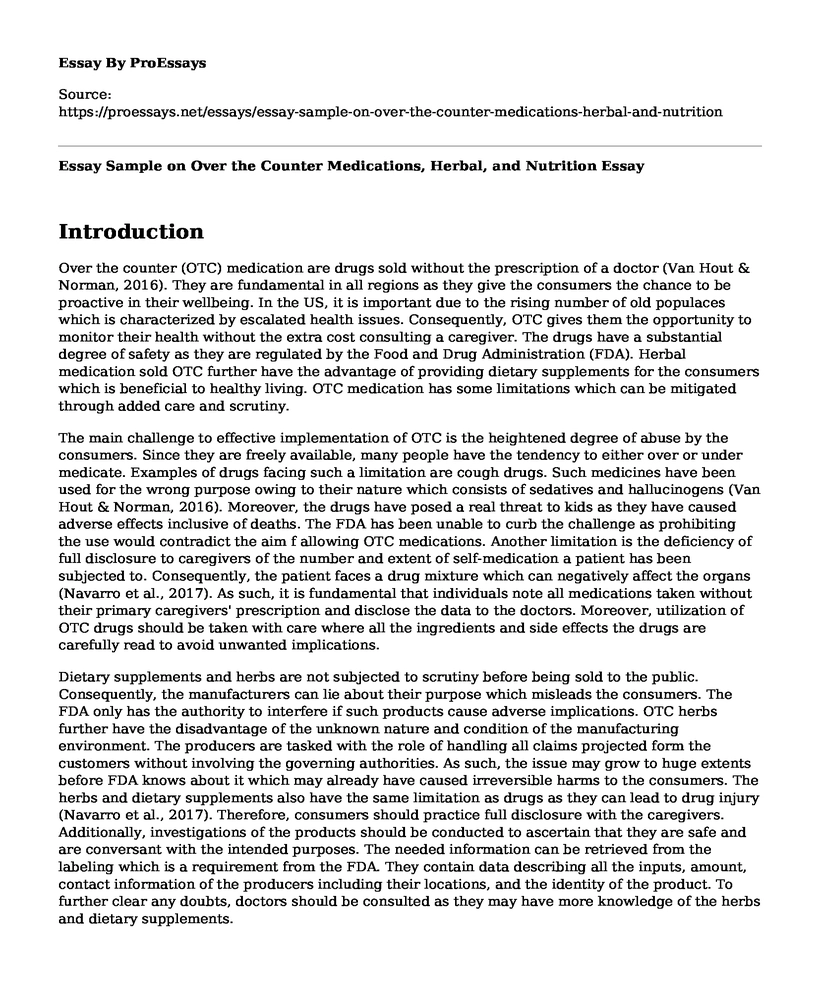Introduction
Over the counter (OTC) medication are drugs sold without the prescription of a doctor (Van Hout & Norman, 2016). They are fundamental in all regions as they give the consumers the chance to be proactive in their wellbeing. In the US, it is important due to the rising number of old populaces which is characterized by escalated health issues. Consequently, OTC gives them the opportunity to monitor their health without the extra cost consulting a caregiver. The drugs have a substantial degree of safety as they are regulated by the Food and Drug Administration (FDA). Herbal medication sold OTC further have the advantage of providing dietary supplements for the consumers which is beneficial to healthy living. OTC medication has some limitations which can be mitigated through added care and scrutiny.
The main challenge to effective implementation of OTC is the heightened degree of abuse by the consumers. Since they are freely available, many people have the tendency to either over or under medicate. Examples of drugs facing such a limitation are cough drugs. Such medicines have been used for the wrong purpose owing to their nature which consists of sedatives and hallucinogens (Van Hout & Norman, 2016). Moreover, the drugs have posed a real threat to kids as they have caused adverse effects inclusive of deaths. The FDA has been unable to curb the challenge as prohibiting the use would contradict the aim f allowing OTC medications. Another limitation is the deficiency of full disclosure to caregivers of the number and extent of self-medication a patient has been subjected to. Consequently, the patient faces a drug mixture which can negatively affect the organs (Navarro et al., 2017). As such, it is fundamental that individuals note all medications taken without their primary caregivers' prescription and disclose the data to the doctors. Moreover, utilization of OTC drugs should be taken with care where all the ingredients and side effects the drugs are carefully read to avoid unwanted implications.
Dietary supplements and herbs are not subjected to scrutiny before being sold to the public. Consequently, the manufacturers can lie about their purpose which misleads the consumers. The FDA only has the authority to interfere if such products cause adverse implications. OTC herbs further have the disadvantage of the unknown nature and condition of the manufacturing environment. The producers are tasked with the role of handling all claims projected form the customers without involving the governing authorities. As such, the issue may grow to huge extents before FDA knows about it which may already have caused irreversible harms to the consumers. The herbs and dietary supplements also have the same limitation as drugs as they can lead to drug injury (Navarro et al., 2017). Therefore, consumers should practice full disclosure with the caregivers. Additionally, investigations of the products should be conducted to ascertain that they are safe and are conversant with the intended purposes. The needed information can be retrieved from the labeling which is a requirement from the FDA. They contain data describing all the inputs, amount, contact information of the producers including their locations, and the identity of the product. To further clear any doubts, doctors should be consulted as they may have more knowledge of the herbs and dietary supplements.
Conclusion
In conclusion, OTC medication and dietary supplements have a lot of vital merits. They enable assessment and self-care. However, their utilization should be undertaken with extra care to ensure the mitigation of its disadvantages. For instance, owing to the possibility of causing drug injury, it is important for full disclosure to primary caregivers. The challenge of drug abuse necessitates invention of new techniques to mitigate the problem such as conduction of extensive campaigns.
ReferencesNavarro, V. J., Khan, I., Bjornsson, E., Seeff, L. B., Serrano, J., & Hoofnagle, J. H. (2017). Liver injury from herbal and dietary supplements. Hepatology, 65(1), 363-373.
Van Hout, M. C., & Norman, I. (2016). Misuse of non-prescription codeine-containing products: Recommendations for the detection and reduction of risk in community pharmacies. International journal of drug policy, 27, 17-22.
Cite this page
Essay Sample on Over the Counter Medications, Herbal, and Nutrition. (2022, Oct 21). Retrieved from https://proessays.net/essays/essay-sample-on-over-the-counter-medications-herbal-and-nutrition
If you are the original author of this essay and no longer wish to have it published on the ProEssays website, please click below to request its removal:
- Poverty Among Children in Uganda: Annotated Bibliography
- Essay Sample on Mental Health and Substance Use Disorders in Adolescents in Alaska State
- Essay Sample on Concept Mapping of Bullying
- Essay Sample on My Immigrant Experience
- Essay Sample on Effects of Non-Prescribed Stimulants Among Students and Young Adults
- Research Paper on Intimate Partner Violence: A Growing Public Health Concern
- Essay Example on Exploring My Interest in Health-Related Fields: A Journey of Self-Discovery







